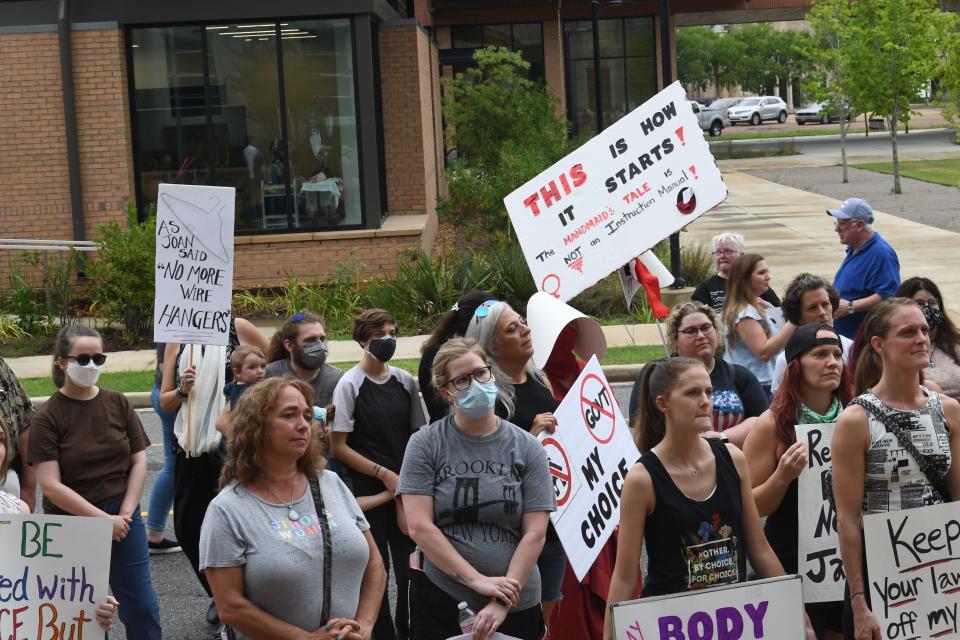'Are their rights rewritten?': Alexandria protest spotlights reproductive concerns, other human rights
Editor's note: This story explores thoughts of suicide. If you are at risk, please stop here and contact the National Suicide Prevention Lifeline for support at 1-800-273-8255.
Duana Juneau, a sexual assault nurse examiner, thinks about the 12-year-old girl that got pregnant after her uncle raped her.
She also thinks about her own daughters, her son's future wife and later generations of women not having access to reproductive care.
"Are their rights rewritten? I am finding this hard to explain. I think it’s going to be a snowball effect with unintended pregnancies and births placing women in need of urgent and life-saving needs, not to mention increasing their risk of depression," she said. "What’s next, other protected civil rights?"
These concerns are what brought Juneau and others to the "We Won't Go Back!" protest rally held Wednesday on the steps of the Federal Courthouse in downtown Alexandria.
More: Gender identity discussion would be forbidden under Rapides schools policy revision
"By the overturning of Roe vs. Wade, I feel as though women’s autonomy has been set back by 50 years," said Juneau. "I grew up with an expansion of women’s rights, dignity, equality, privacy and freedom and I feel this will change."
The rally protest was organized by Samantha Stanley in response to the U.S. Supreme Court overturning the 1973 landmark case Roe vs. Wade which said the right to an abortion was Constitutionally protected.
"Yeah, I was a hippie in 1973," said Suelynne B. Mickey. "I remember it well. I remember celebrating and getting excited because no more backroom abortions. No more women dying from having things that were wrong - getting infections and things like that."
Fighting for all rights
But for her, this rally was more than just about Roe vs. Wade. It was about fighting for all rights.
"Not just one or two things but the right to vote, the right to freely assemble, the right for healthcare, all different kinds of rights," she said.
Stanley organized the rally to spotlight concerns Alexandria citizens had about the overturning of Roe vs. Wade and the health related issues Louisiana’s trigger laws pose.
"To me personally, women's rights are under attack in Louisiana and across the nation," said Stanley. "It's important that we bring awareness here at home and get people organized so we can go out and vote, and change the people who are in office who are making these decisions for women. They don't have any rights to be making those decisions."

As a gay male, Jason Gray feels it's important to support female friends who have supported him.
"It's my turn to support them and stand up for their rights for reproductive freedom and bodily autonomy," he said. "And if I don't stand up for them, then we all fall together."
Dr. Christina Lord, OBGYN and state treasurer for the American College of Obstetricians and Gynecologists, was one of the guest speakers who told the crowd that women's healthcare should not be a political issue.
"While people may have differing views about abortion, those views must not interfere between the relationship between people and their doctors," she said.
Physicians, she continued, are trained to provide evidence-based reproductive healthcare services and that includes abortion.
"Criminalizing doctors for doing their jobs also harms people who need access to care," she said. "Our healthcare decisions should not be dictated to us by radicals and special interest groups who have lost sight of any middle ground and who feel entitled to insert their personal beliefs into other people's private healthcare decisions."
One of the attendees, Mallory, got up before the crowd and shared the personal story of her late mother. As a young woman, she had been raped.
More: New, old federal holidays added to Rapides' 2022-23 school calendar
"She was raped and did not have access to abortion. And so she carried this child and she contemplated suicide every day," said Mallory. "And that's why my sign says, 'Abortion access is suicide prevention.'"
Mallory said she reconnected with the sister who had been given up for adoption. But she has never told her how she was conceived by rape and has no plans to ever tell her.
A basic human right
Ann Lowrey said she was showing her support for reproductive rights "because personal, individual choice about whether, when, and under what circumstances a woman will or will not have a child, is a basic human right."
Stripping women of the right to make those decisions signals that the Supreme Court and the state do not trust or value a woman enough to make her own decisions, she added.
"Decisions that are very difficult, very personal, and hers alone to make," said Lowrey. "Only people who have been found incompetent are stripped of the ability to handle their personal affairs."
She also feels that the Dobbs decision is racist and sexist and she is outraged by the ruling.
"These laws and others that follow will further impoverish the State of Louisiana, and more importantly, the people who live here," she said. "It's naive to believe that the outcome will be to reduce abortion rates significantly in Louisiana."
She feels the impact of the decision will deny access to reproductive healthcare to the poor, to black and brown women, to women in Louisiana and other states that force religion into public-health policy.
"As a woman living in these United States of America, my life is full of experiences that have shown me that women are seen as the so-called second sex - an antiquated term, no doubt, but the latest attack on reproductive freedom is no doubt the most egregious of them all," said Lowrey. "I'm marching because I'm afraid of what happens next."
This article originally appeared on Alexandria Town Talk: Alexandria protest spotlights concerns about healthcare, other rights


